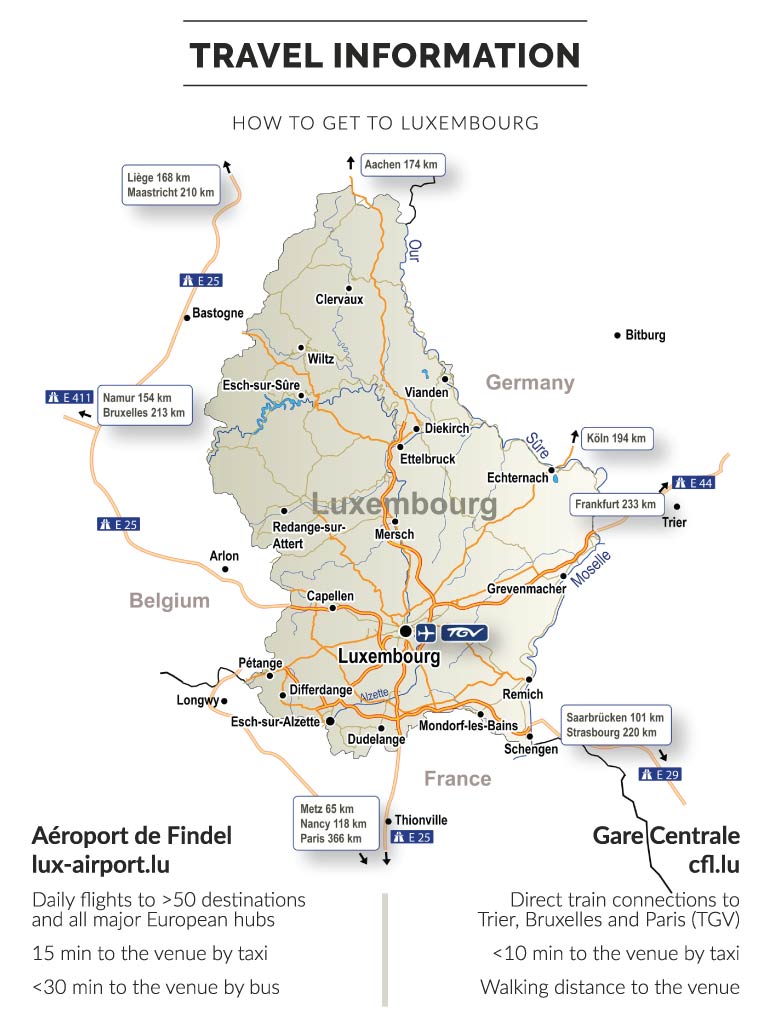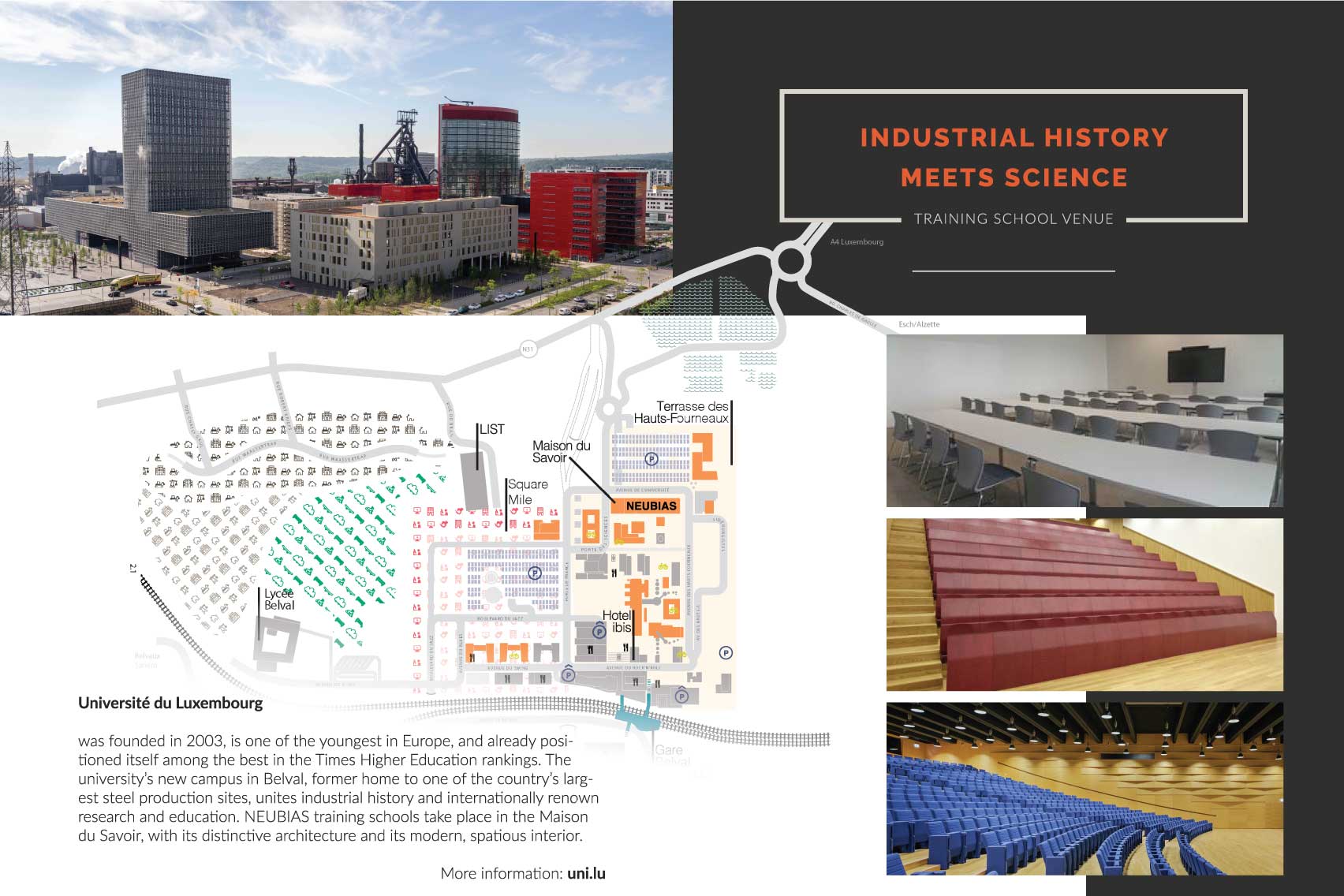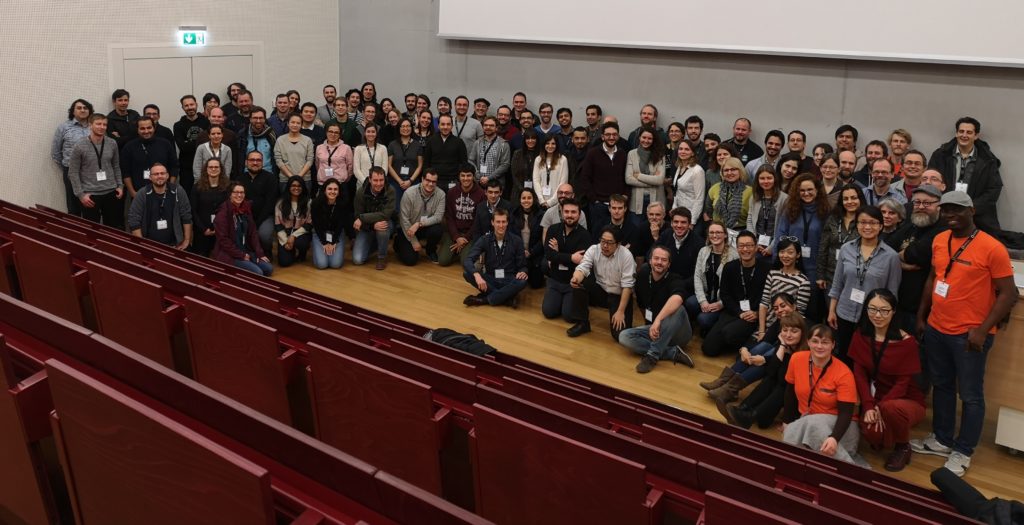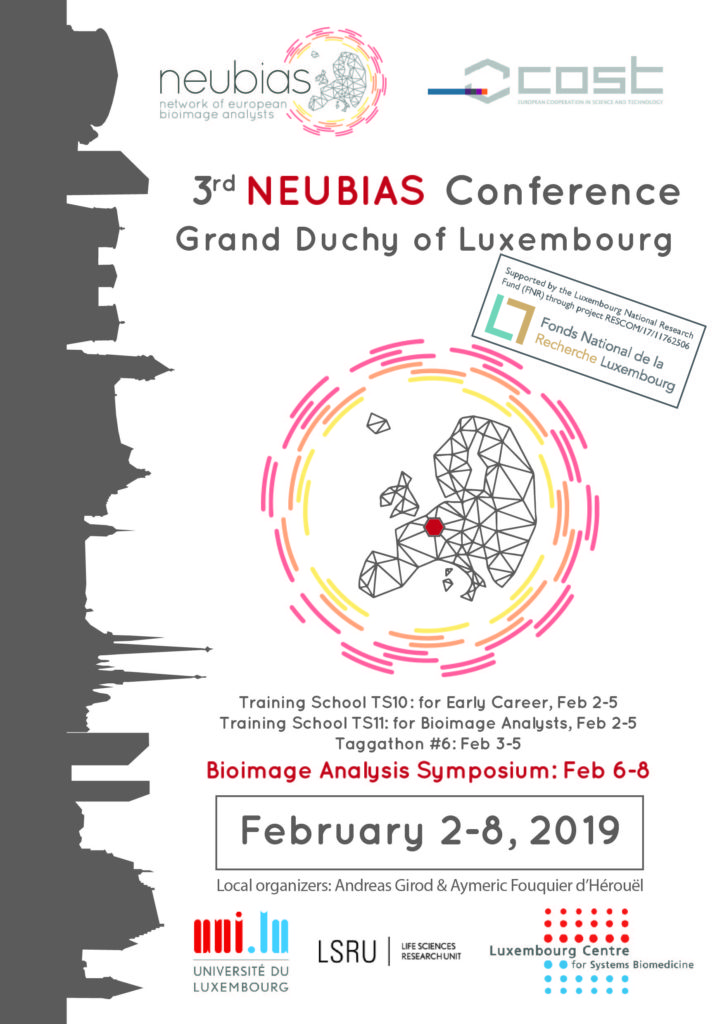THANK YOU !!! Another successful Training School event, thanks to local organizers and trainers!
Contents
5th Training School for Early Career Investigators (TS10), Luxembourg 2019
Topics:
-
- Principles, techniques and ethics of digital image processing (DIP); publication of bioimages.
- Building practical workflows to analyse 2D, 3D & time-lapse bioimages
(eg. object segmentation and densitometry, spot detection & tracking or filament tracing) - Introduction to workflow automation: record & reuse commands, scripting of workflows/pipelines
NOTE – this school in NOT introductory, however it is also NOT focused on training scripting/macros. If you are already familiar with image analysis and at least 1 scripting language and feel you want to dwelve more into workflows and advanced topics ia IA consider TS11 for Bioimage Analysts in the same venue. - Extracting and validating quantitative numerical data from bioimages
- "WOYOD" - solve your own problem, code your workflow and explore different tools with help from Analysts
follow #NEUBIAS on Twitter
Requirements
- Applicants should have own data to bring to the school which they have started analysing, and be able to explain what they need to learn about image analysis to advance their research (explained in application form) – some basic-level experience with a tool like ImageJ is advisable, but not required.
- Must fill valid application form (link at the end of this page) BEFORE the deadline (see above)
- Must include brief letter of motivation (text pasted into registration form), mentioning level of proficiency and interests, and propose a mini-project with goals for the school (e.g., a specific image analysis tool or workflow they are interested in getting help from our expert trainers)
- Must be able to attend all days/times of the course (no exceptions!)
- Must be able to bank-transfer administrative charges.
- Must comply to administrative conditions and confirm travel&hotel by December 20th – read conditions at end of application form!
Trainers
- Anna Klemm, Bioinformatician/BioImage Analyst @Dept IT of University Uppsala, Sweden
- Bertrand Vernay – Imaging specialist @ MRC Centre for Regenerative Medicine, Edinburgh, UK.
- Edna, Xian Hu, Head Engineer @University of Oslo, Norway
- Fabrice Cordelières – Bioimage Analyst & Microscopy Specialist @CNRS/Bordeaux Imaging Center, France
- Ignacio Arganda-Carreras – Developer @ Dep. Computer Science & Artificial Intelligence, Basque Country Univ, Donostia-San Sebastian, Spain
- Jean-Yves Tinevez - Bioimage Analyst & Developer @Pasteur Institute – Paris, France
- Jonas Øgaard– Bioimage Analyst @RIIM – Oslo University Hospital, Norway
- Joyce Kao - Researcher, Bioimage Analyst @ETH Zürich, Switzerland
- Kota Miura – Bioimage Analyst @University of Heidelberg, Germany & NIBB, Okazaki Japan
- Marion Louveaux - Researcher, Analyst @Ruprecht-Karls-Universität Heidelberg, Germany
- Robert Haase Bioimage Analyst @MPI-CBG, Germany
Brief programme
Progamme organizers: Jonas Øgaard, Joyce Kao, Marion Louveaux
morning coffee-breaks @10:30/16:30, lunch @12:30, dinners @19:30
|
Day 1
|
Day 2
|
Day 3
|
Day 4
|
days 5-7 "Symposium"Free for all TS participants! |
What is, and what is not, included?
- Once accepted we will contact you with instructions to install all materials
- All trainees are provided with coffee breaks, lunch and dinnersand 1 gala
- Travel & accommodation are not included for trainees (see below how to travel to venue and hotels nearby).
Venue & contacts
University's Belval Campus in Esch-sur-Alzette
Travel & Hotel info:
Heart of the European Union and home to core European institutions, Luxembourg is well-known for its successful steel and banking industry. Enclosed between Belgium, Germany and France, the country with its 600000 people is also home to about 170 different nationalities, making it one of the most multilingual and multicultural places in Europe.Luxembourg, the only remaining Grand Duchy in the world, looks back to a rich history and culture, with its more than 50 castles, its famous old town fortifications, its museums, theatres and music venues, and not least, its restaurants. Luxembourg City, home to 100000 inhabitants, benefits from a reasonable size, perfect to be explored by foot or bike.With the recently founded University, and long established public research institutes, the country is emerging as hub for scientific development and higher education. Strong international collaborations and good funding opportunities are boosting innovation in fields as diverse as material science, biomedicine and communication technology, in addition to classical academic disciplines.Join us for the NEUBIAS conference in Luxembourg and explore the many attractions we have to offer!
How to get to Luxembourg
 How to get to the TS venueTraining Schools and the Taggathon (2-5 February 2019) take place on the university's new Belval Campus in Esch-sur-Alzette. Located on the former grounds of one of the country's largest steel plants, the site combines industrial history and science, with direct connections to downtown Luxembourg and easy accessibility by car, train or flight. The Symposium (6-8 February 2019) takes place at the historical Abbaye de Neumünster, in the Old Town of Luxembourg. It is conveniently located within walking distance of several hotels, a modern and comfortable youth hostel, and many of the city's attractions.Training Schools & Taggathon: Université du Luxembourg
How to get to the TS venueTraining Schools and the Taggathon (2-5 February 2019) take place on the university's new Belval Campus in Esch-sur-Alzette. Located on the former grounds of one of the country's largest steel plants, the site combines industrial history and science, with direct connections to downtown Luxembourg and easy accessibility by car, train or flight. The Symposium (6-8 February 2019) takes place at the historical Abbaye de Neumünster, in the Old Town of Luxembourg. It is conveniently located within walking distance of several hotels, a modern and comfortable youth hostel, and many of the city's attractions.Training Schools & Taggathon: Université du Luxembourg
Staying in Luxembourg (suggested hotels)
A number of hotel rooms have been pre-booked for the NEUBIAS Training Schools, Taggathon and Symposium. When making your reservation, please be sure to specify your participation in the NEUBIAS conference to benefit from the negotiated room rate. Our conference office will gladly assist you with your booking, thus do not hesitate to contact us beforehand. Negotiated rates are guaranteed until a limit date, after which unbooked rooms will be freed. Hover on the room rates to see limit dates, where applicable. To the room rates, a city tax of 2 EUR is typically added per night (subject to change).Youth hostels in Luxembourg are modern and comfortable, and are a good alternative for budget accommodation. Rooms can be booked for single occupancy and with private bathroom. The hostel in Esch-sur-Alzette is perfectly located to attend the training schools.
The local organizers welcome you to Luxembourg!
Travel Grants
NEUBIAS will offer competitive Travel Grants to a number of the Trainees applicants affiliated to institutions in COST member countries or Near-Neighbour Countries or approved European RTD Organisations (check definitions in COST Vademecum here). Please check in the application form how to apply for those grants by filling the additional fields enabling to submit a justification. We typically provide less than 1/3 of the grant applications received, so any documented information provided to demonstrate why you need a travel grant is important for us to fully assess your request. The grants are supported by COST (funding body of the NEUBIAS Action). Eligibility and reimbursement modalities will follow the criteria/general COST policies (check the Vademecum here). Granted trainees will be notified before June 30th. Please be aware that grants can only be executed AFTER the Training School (daily signature on attendance sheets compulsory for grantees). The grants are attributed at a fixed rate (TBD) to cover for travel and accommodation.
Selection Criteria (for all, including granted Trainees):
Trainees will be selected strictly on the basis of their scientific motivations, as described in their motivation letter. Upon selection, NEUBIAS will seek proof of the candidates status as "early career investigator" and of being actively working on the project(s) as described in the motivation letter. Gender balance and geographical distribution will be taken into consideration according to COST policies, and only after pre-selection of eligible/suitable candidates and in the case that applicants are too numerous as compared to the number of available seats. Evaluations of the applications is operated by "double anonymous" (no mention to name, institution, country) review by the Training Schools Evaluation Committee of NEUBIAS.




